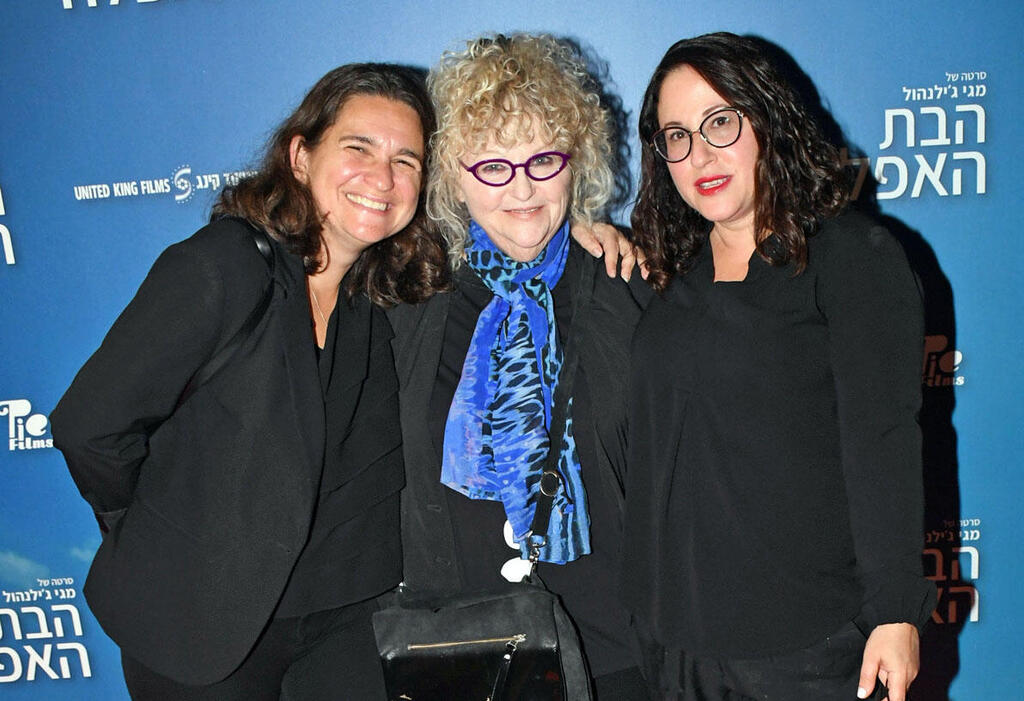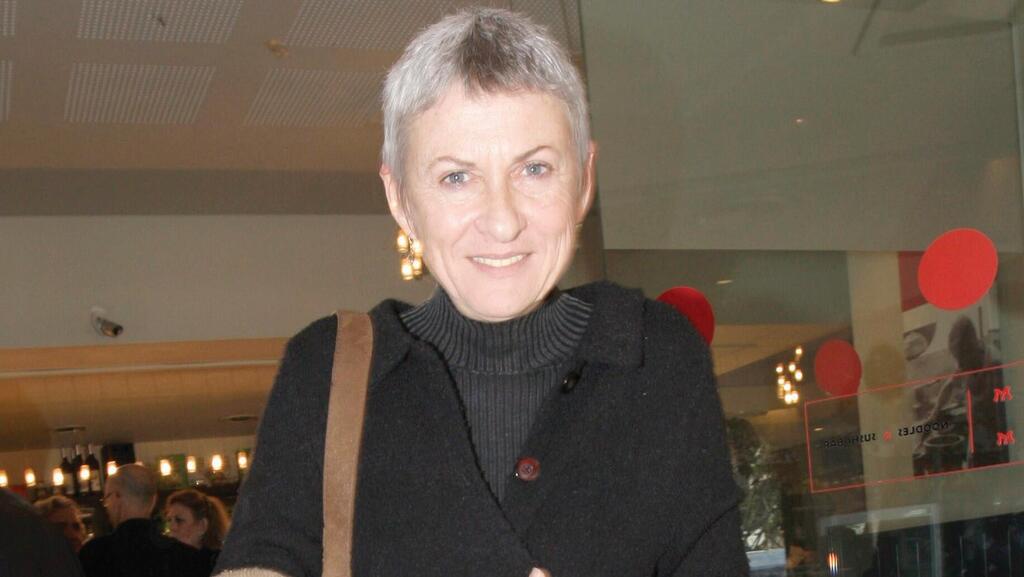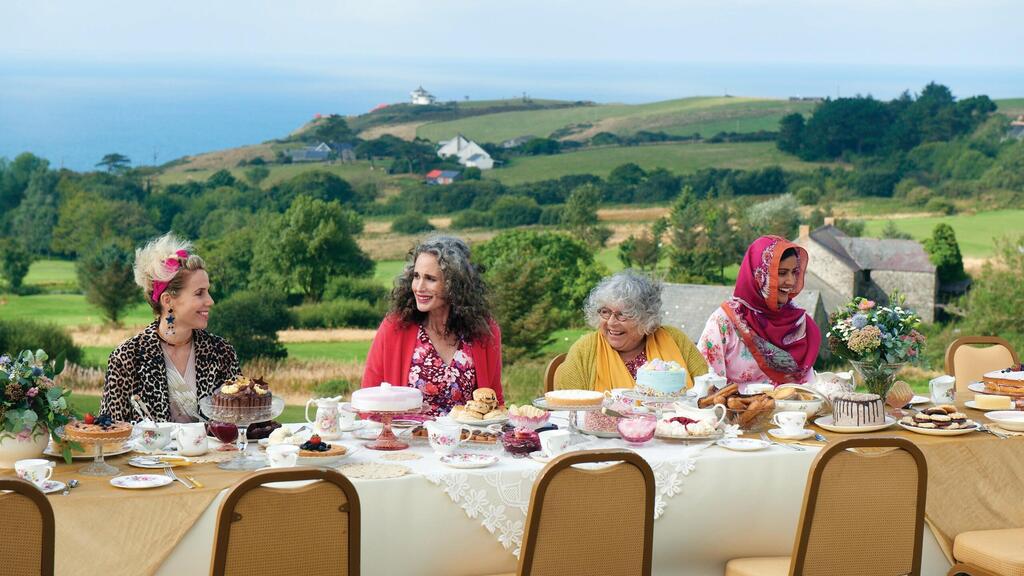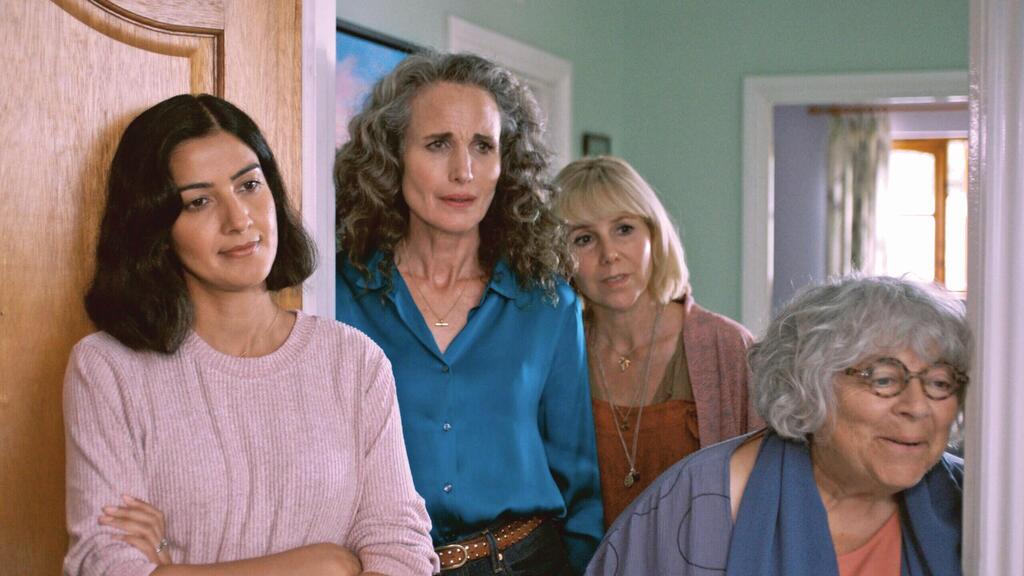Getting your Trinity Audio player ready...
Twelve years ago, film producer Talia Kleinhendler,45, received a phone call from the renowned impresario Eric Kneller, who invited her to the Cameri Theater of Tel Aviv to watch the play "Sof Tov" (My Happy Ending) by the late screenwriter Anat Gov, directed by Edna Mazya. Kneller thought it could be a good idea for a film and insisted that she come to see the play in order for her to understand what he was prattling on about. The play revolves around an actress who discovers she has advanced-stage cancer (originally played by Anat Waxman) and realizes she doesn't want to undergo the difficult treatments.
"I was seven months pregnant and went to the show with my mother," recalls Kleinhendler. "While in the restroom, I overheard conversations among cancer survivors who came to watch the play for the third or fourth time. It touched me and made me think that it could be a story worth telling in cinema. Two weeks later, I had the opportunity to meet Anat Gov. We talked a little about how we could make it happen. Anat was interested and said, 'Well, go give birth first, and then we'll talk.'"
Gov, who was married to Israeli singer, TV host and actor Gidi Gov, died about a year and a half after the play premiered. This month, almost 13 years after her death, the film "My Happy Ending" – based on "Sof Tov" – starring Andie MacDowell, is being released in Israel, after it was already released in the United States in February. The screenwriter Rona Tamir is to thank for writing a successful adaptation of the play, which Sharon Maymon and Tal Granit directed.
Talia Roth, the protagonist of the original play, is transformed into Julia Roth, played by McDowell, a 58-year-old Hollywood star diagnosed with colon cancer. She arrives at a hospital in England in secret, accompanied by Nancy – her personal manager who is also her ex's sister – overseeing the covert operation of bringing her to the hospital. Nevertheless, within minutes, the women in the department recognize the celebrity under her sunglasses and hat and invite her to join their enlightening conversations about life.
Kleinhendler's partner in the production company "Pie Films" is Osnat Handelsman-Keren, 45, who purposely did not attend the play. "I purposely didn't go, so it wouldn't be difficult for me to disconnect from the show," she explains.
"I was already thinking about the future film," she said. "But when I read the script, I felt that there was something powerful here that every woman could connect to. It's primarily a universal story. All our films have always had an outward gaze, but in this film there was something that almost wanted to go beyond the borders of Israel."
Why did it take so many years?
"There were all sorts of delays. We started brainstorming about it, and then Anat Gov passed away. We felt that we needed to wait a moment before we returned to business as usual. Then each stage required its own time. At first, we were looking for American screenwriters. In the end, we found Rona, who writes in English and understood the humor and the play in a way that someone who is not Israeli wouldn't have been able to, and she made it international with the addition of Nancy, the personal manager, for example. That's a character that doesn't appear in the play. At first, I thought about directors from around the world until we decided that Sharon and Tal, with whom we made the film 'Mita Tova' (The Farewell Party), were the right ones for this. Afterward, we looked for actresses, and anyone who has tried to recruit an actress abroad knows that it takes time to find the right actress and reach her. If you don't give up, eventually things happen as they should."
"A rare and strange breed of film producers"
One of the reasons things worked out is thanks to producer Tmira Yardeni, 75, who decided to invest money and join the international projects of "Pie Films." Yardeni, the owner of Tedy Productions, is known as the person who brought "Ha-Comedy Store," "Our Song," "Kochav Nolad" ("A Star is Born"), "HaShminiya," and many iconic shows to Israeli television. In 2005, she was diagnosed with breast cancer, underwent chemotherapy and recovered.
"I was a friend of Anat Gov," she said. "It's a strange story of how we met. She was a fan of 'Our Song' and said to me, 'I want to do something like that, but for the youth,' and we had many meetings at a coffee shop. We sat and thought. She knew that I carry the BRCA gene, that I am at risk for breast cancer, and that I keep up with check-ups, because why should I die? It's worth checking and treating on time. And that's how it was – I got sick, I was treated and everything is fine. Anat told me, 'My mom had colon cancer, but I won't check myself, I'm not interested.'"
"And then one day she took me to her coffee shop in Ramat HaSharon and said to me, 'So, yes, I got sick.' I wanted to hit her. It was so obvious that this would happen, just like I got sick. Our parents carry the gene and we got 'infected,' so to speak. She said, 'Don't be so sorry, I did my thing,' and I said to her, 'But you still have so much time left to do.' When she started medical procedures, she scheduled a meeting with me and said, 'I want Gidi to travel the world. Do you want my will? And here: make a program with Gidi and Aharoni.' And that's what I did."
How did you get on board with "My Happy Ending"?
"Over the years, I had meetings with Moshe Edri and others about various commercial film projects, and I said, 'Things like "Savri Maranan," I can already do on television.' It didn't ignite anything in me. But this film, 'My Happy Ending,' ignited something in me. Osnat and Talia are a rare and strange breed of film producers, and I loved that they were women dreaming and producing movies. I won the lottery with them. I know the industry, and they are unlike anything else. Making films in Israel, as I learned from them – there is never a budget for it. But I saw that from the shortage, they create abundance, and a high-quality film always comes out of it. ... We met, and I said, 'Okay, in a limited way, I will join you in the projects and invest.' I had never invested in a film before. It's so much fun for me that I can join these girls and learn a bit about filmmaking and how it works."
I want to suggest a reason why you want to make films: Cinema fights the transience and fragile nature of life. Perhaps you understood, after you fell ill, that in order to leave a mark in the world, you need to make important films?
"I didn't think that big," she laughed. "What you're saying is beautiful, it's a strong message about what cinema is, but I didn't think about my perpetuity in the world. I don't think about perpetuity at all. I'm here and now, unequivocally. But yes, there is something special about cinema."
5 View gallery
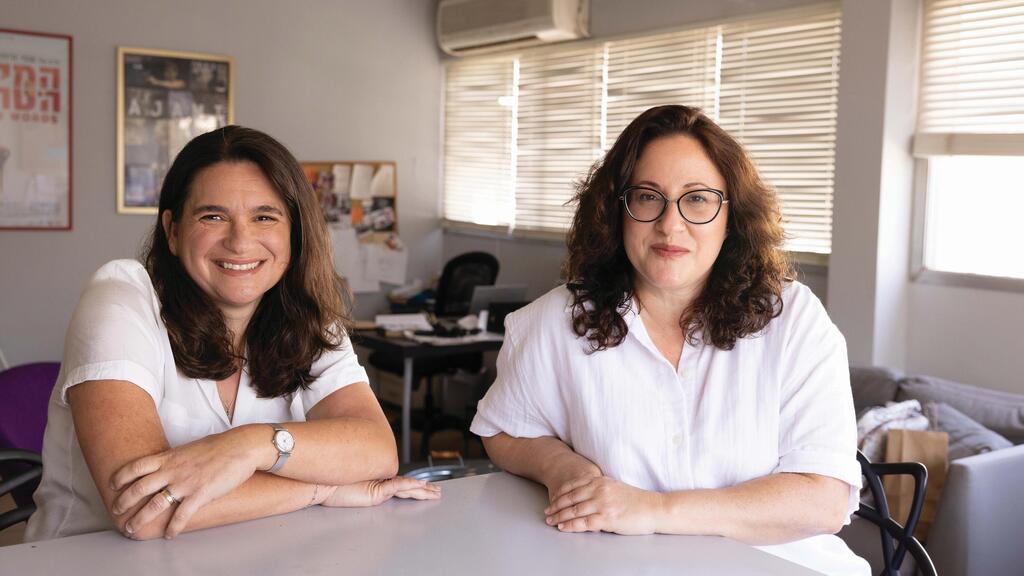

Talia Kleinhendler and Osnat Handelsman-Keren are the producers behind "My Happy Ending"
(Photo: Tal Shachar)
Pregnancy and newborns while filmmaking
Handelsman-Keren, a Tel Avivian wife and mother of two children, ages 14 and 17 , grew up in Herzliya and spent part of her youth in Brussels, Belgium, due to her father's work. She has a degree in film from Tel Aviv University and, in her final year of studies, she began working at the distribution company Shapira Films.
Kleinhendler, a wife and mother of three children ages 6, 11, and 14 , grew up in Jerusalem and now lives in Tel Aviv as well. She was an independent film producer and also a graduate of the film department at Tel Aviv University. The two met thanks to a mutual friend, film producer Maya Amsalem. After they had lunch together in 2010, they discovered their chemistry, and founded the production company Pie Films. Their films have been showcased at prestigious festivals worldwide, including in Cannes, Toronto, Berlin and Venice.
"It was clear that the main character had to be a Hollywood star in every sense of the word. How many stars like that are there?"
Their breakthrough into international cinema began with the American adaptation of the film "The Kindergarten Teacher" by Nadav Lapid. In 2018, four years after the Hebrew version was released, an English version starring Maggie Gyllenhaal was also released.
There aren't many Israeli producers who do what you do
"It's hard work, and it always takes longer than you think," said Kleinhendler. "We have a sense that there are no limits to what we can do in the world. That's where I felt I had added value as a producer in Israel, the international aspect. Even before Osnat joined me and I opened my own office at the age of 25, I had partnerships with other producers in Israel, and I always took on the international aspect."
How did the connection with Maggie Gyllenhaal happen?
"We wanted to make an English version of 'The Kindergarten Teacher,' so we were looking for American producers. I reached out to American director Sara Colangelo. Through her, we met Maggie, who played the lead role. Eventually, she also joined as a producer, and a genuine and strong friendship was formed between us. We asked her if she wanted to direct a film, and we ended up doing 'The Lost Daughter.'"
"The Lost Daughter," an adaptation of the novel by Elena Ferrante, starring Oscar winner Olivia Colman ("The Crown"), was released in 2021 and was nominated for three Oscars (screenplay, actress, and supporting actress). At the Independent Spirit Awards, it won the Best Film Award, Best Director Award, and Best Screenplay Award. At the ceremony, the award-winning mothers thanked their children and husbands for their support throughout the journey.
Is it possible to make a film without any support?
Osnat: "I had the great privilege of growing up with parents who told me that whatever I want to do, I can simply do it, and then live with a husband who, when I tell him we have an idea for a movie, says, 'How wonderful, what are you doing with it?' And yet, when we're not on set, I'm very present at home and work as a taxi driver for my children. The only thing I struggled with was not apologizing when I was on set and something happened at home. Today, Talia and I are aware of our place and responsibility as women toward other women and, on my agenda, we are there for young Israeli female creators when they need help and advice. There was a director who called us when we were about to start filming and said, 'Listen, I don't know how to tell you, but I'm pregnant.' We said, 'Amazing,' and Talia said, 'I'm pregnant too,' and that's how we postponed the filming. We had a casting director that had a child, and we told her, 'Great, bring him with you,' and so in every rehearsal, there was a baby being passed around our arms. Similarly, for men who want time with their children, it's the same thing."
Talia: "Not exactly, because there is a physical aspect here that makes the decision of when to give birth more difficult for female directors who need to find that moment within their lives to get pregnant. If they want to, not everyone needs to. As a producer, I had more freedom of choice because I didn't have to be on set 24/7."
Osnat: "When we filmed 'The Lost Daughter' at the beginning of the pandemic, the children came with us to the Greek island and were in quarantine at home on the beach. In 'My Happy Ending,' we had a crew of four parents who had been away from their children for quite a few months, and it was hard. This experience was no different for Sharon, the director, who is a man, and Talia, the woman director."
Talia: "I have three children, and I had them while making movies. The price is that I have never taken more than a week off when I gave birth, even less. When I was in the car on the way to give birth to my daughter, I corresponded with my lawyer in London. She sent me an email: 'Go give birth, I'm disconnecting you from email. Stop contacting me when you're on your way to the hospital.'"
Osnat: "And she also spoke to me from the delivery room after giving birth, okay? It's at that level."
Talia: "When 'The Lost Daughter' was released, a British journalist asked us in an interview with Maggie Gyllenhaal how we manage, and the three of us said, 'We barely manage.' It's never easy."
The perfect casting
"My Happy Ending' is part of a trend that is gaining momentum – putting mature women in leading roles. It happens because there are more actresses producing their own projects, like Nicole Kidman and Reese Witherspoon. You no longer have to wait for a powerful American male producer to lift your career
"It's a trend that needs to grow," said Handelsman-Keren. "There are many actresses today who are storytellers and want to influence industry trends, and they say, if there isn't a story in existence that I want to tell, I'll create it, and what's better than having more women on screen and more stories?"
Tmira: "This trend exists in Israel as well, including among stand-up comedians. It didn't exist when I started."
To turn the famous play into a screenplay, the producers recruited Rona Tamir, who dove into an investigation and had conversations with doctors, psychologists, and sociologists. "We discovered that hair is personal for women," said Handelsman-Keren. "It was clear that the main character had to be a Hollywood star in every sense of the word, like Julia Roberts or Andie MacDowell. How many stars like that are there?"
Talia: "I always thought that someone like Andie, who is identified with her hair – which even today, when it's gray, is indescribably beautiful – could fit. When you think of her losing it, there is something significant about it, there is more weight to it."
It's a film about a 50-plus-year-old star who is searching for her place in an industry that idolizes youth.
"She leads some kind of movement of saying 'I am at the age that I am, and it's beautiful.' And that's just the beginning of this process where women talk about their age. Andie understood the role more than we understood it."
Osnat: "In our early conversations and during the filming, Andie brought so many things that only someone like her, from her position as a star, could say. She had a beautiful sentence. She said that in meetings with people, she always asks if they want to meet her or meet the actress Andie McDowell. And what do they want her to give them, the star or herself? That's what she brought with her to the scenes. We filmed in a situation that wasn't easy and not in the conditions of a Hollywood star, and she simply gave it her all."
How difficult was it to cast her?
"Easier than expected. There was something in the script that she connected with. When we were growing up, she was the biggest star in the world. There were years when she was a bit absent and didn't make big movies, and now she's back big time, not only with us but also with the amazing series she's doing ('The Way Home,' 'Maid') and the L'Oreal campaign, with her current hair look. When I saw her at the age of 12, I never imagined I would be in the same room with her."
Talia: "Beyond Andie, we had an amazing cast, including Miriam Margolyes (82 years old), who worked like a youngster and made us laugh between scenes.
"In the first reading, when everyone read the script around the table with the director and the writer, Rona and I sat in the back, and there was a moment during one of Sally Phillips and Miriam's 'ping-pongs' around the table that I looked at Rona and she looked at me, and we just grinned. We could have filmed it right then and there during the reading."
The filming took place at a university in Wales during the height of the COVID-19 pandemic. "The actresses became somewhat of a family, taking care of each other and constantly looking out for Miriam," Handelsman-Keren recalled with a smile. "They made sure she never ate alone and created a sense of community among themselves, which was very helpful because we were isolated in a very small place. They all knew about Anat's story, and it was important to them."
Tmira: "As an observer from the sidelines, I traveled to Wales in the midst of the pandemic, which is unimaginable in itself. I saw them arriving every morning, acting, and not one complaint was heard from them. I sat with my headphones on and thought, it's indescribable, not a single one complained."
Talia: "During the pandemic, we saw the difference between us and producers worldwide. In Israel, we quickly understood the situation and acted creatively. Both of us understood the need to act responsibly and safely, but we didn't stop and found solutions and continued filming. We didn't panic. As a producer, you learn that if someone tells you 'no,' you find a way to reach 'yes.'"
The main character, Julia Roth (McDowell), says in the movie that cancer changes your priorities.
Tmira: "I'm the only one who went through it, so yes, cancer changes your thinking and priorities. You simply get a wake-up call, and from that moment on, you understand that most things are not important and that the meaning is what matters. Today, I think cancer is great. If you come out of it healthy and whole, it's an experiment for life."
Osnat: "Unfortunately, we all know people who have been affected by or have passed away from cancer. Cancer is the most present disease today. While working on the script, my dear friend, Idit Shatz (may she rest in peace), who also designed the posters for our films, told me she was sick. Unfortunately, she didn't get to see the movie. There were a few other people we would have been happy if they could have watched it, that didn't get the chance to."
And given all this, it's still a movie with a lot of humor.
Osnat: "In my opinion, that's why cinema is one of the most amazing experiences. Many people sit in a dark theater, laughing or shedding tears together. What other collective experience like this do we have in the world?"
The movie's protagonist doesn't believe in miracles, but her friends do. Do you believe in miracles?
"Julia believes in her power to change reality more than something external like treatment. Her biggest insight is not to waste time trying to be someone else, and that's what I'm also trying to do. We invest so much energy into how we are perceived externally, but the real thing is to be true to what you want. It's the hardest thing in the world when there's so much noise around you.
Will there be more international projects in the near future?
Talia: "There will be another film with Maggie. And we hope to work with Andie again. Our goal is to make both international and Israeli films."
Osnat: "'Sof Tov' (My Happy Ending), which is a British co-production, is also very Israeli in its essence."
Talia: "And that's the voice of Anat, who was, of course, as Israeli as can be."


